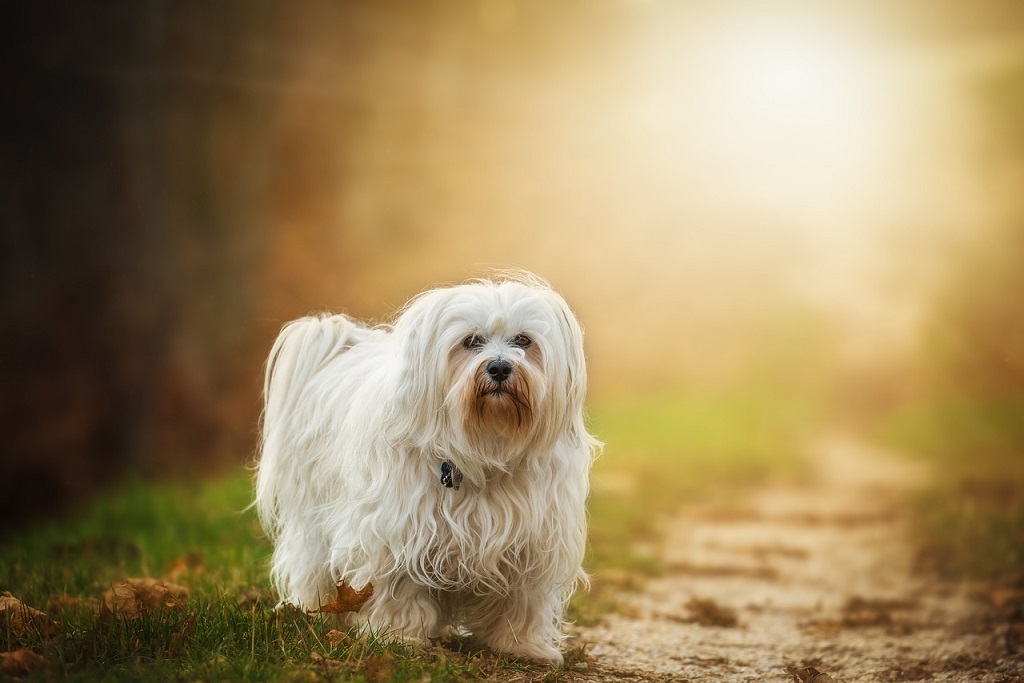Looking for a fearless and confident small dog? Havanese could be the best match for you.
The Havanese dog is like a minion that just fell from heaven. With silky long hair and soulful eyes, this munchkin is more than just your average lap dog. While most small dogs are coward, these pups are fearless, confident, and snappy. Their huge and larger-than-life personalities are packed in tiny bodies but that does not stop them from becoming the center of attention wherever they may go.
If you are considering getting a Havanese puppy and looking for a detailed guide on the breed, you are in the right place. In this article, you’ll find everything about this adorable dog including features, traits, health-related issues, and much more.
In the US, the Havanese dog is quite popular, especially in various states on the East Coast such as New York, New Hampshire, Georgia, and Florida. You can find some best Havanese Breeders in Florida and other states that have improved the overall breed standard.
So, let’s find out more about Havanese below.
Table of Contents
Introduction to Havanese Dog
The Havanese dog breed traces its origins to the port city of Havana in Cuba. These dogs are said to have descended from the now-extinct Tenerife and Blanquito de le Habana dog breeds. The Havanese is the only dog breed native to the country of Cuba and this is one of the reasons why it is regarded as the national dog of the country.
The Havanese have almost always been associated with royalty and wealth. In Cuba, they were a symbol of nobility while in Europe they were famous as circus dogs and performers. Queen Victoria of England and the famous author, Charles Dickens were among the admirers of the Havanese dog, having kept one as a pet at some point during their lives.
During the Cuban Revolution of the 1950s, the Havanese dog breed made its way to America where it was welcomed with love and adoration. The breed gained instant popularity and was accepted by the American Kennel Club as a toy group dog in 1999.
Breed Features
While all dogs are cute in their own way, the Havanese stands out for the exquisite features that make it especially beautiful. Here’s a quick list of what makes this breed so handsome.
- The breed is famous for its gorgeous silky coats that are soft and light like actual silk.
- Their double coats can be found in a multitude of colors ranging from chocolate brown to a combination of black and white or just pure white and beige.
- The Havanese dog has broad and folded ears, round around the tips. You can barely see them because they are concealed under their coats.
- They have adorable almond-shaped eyes- found in colors like hazel and black.
- Their nose is triangular with black or brown colors and placed gracefully at the center of their skull.
- Their cute pink tongue can often be seen sticking out when they are excited and happy.
- As for the tail, it is high-set and curly as it is covered with wavy, undulating hair. The Havanese can be seen wagging their tails to show their approval.
- They have tiny legs and an overall small and compact body.
- The average Havanese dog weighs about 5 to 7 kg and it grows as tall as 25 to 30 cm.
Pros and Cons of Having a Havanese Dog
Pros of Having a Havanese Dog:
Affectionate and Sociable: Havanese dogs are known for their friendly and affectionate nature. They often form strong bonds with their owners and enjoy being part of family activities.
Adaptable to Living Spaces: They are adaptable to various living environments, including apartments. Their small size makes them suitable for urban living.
Intelligent and Trainable: These dogs are intelligent and respond well to training. They can learn commands and tricks, making them enjoyable to train and interact with.
Low Shedding: Havanese dogs have a coat that sheds minimally, making them a good choice for individuals with allergies or those who prefer a dog with lower shedding.
Alert and Watchful: They have a good sense of alertness, making them effective as watchdogs. They will often bark to alert their owners of approaching strangers.
Cons of Having a Havanese Dog:
Grooming Requirements: The long, silky coat of the Havanese requires regular grooming to prevent matting and tangling. Owners need to commit to brushing and grooming sessions.
Separation Anxiety: Havanese dogs may develop separation anxiety if left alone for extended periods. They thrive on companionship and may become distressed when isolated.
Potential for Small Dog Syndrome: Small dog syndrome, where a small dog believes it is the pack leader, can be a concern. Consistent training and proper socialization are essential to prevent behavioral issues.
Can Be Vocal: Havanese dogs may be prone to barking, especially if not trained to control their vocalizations. This can be a consideration for those in noise-sensitive environments.
Grooming & Care
The Havanese dog is blessed with an exquisite-looking coat which is why dog owners have to make extra effort to keep it fabulous.
Most dog owners, trim their dog’s hair to prevent it from hindering the dog’s movement. But the coat still requires daily combing and frequent baths to keep it soft and de-tangled.
Apart from this, the Havanese require their nails to be trimmed at least twice a month and their teeth to be brushed several times a week.
Lastly, keep a close look at their ears and make sure they are clean and no wax/foreign objects are stuck in them.
It is important for dog owners to always inspect their fur babies during grooming to check if they have any rashes or inflammation. This ensures that the dog remains healthy and happy.
Training
You might think that these small pups are dull but they are absolute powerhouses. In fact, sometimes it might get hard for dog owners to keep up with their furbaby’s energy levels.
The Havanese requires as much exercise as any medium-sized dog. They should be walked at least once a day for 20 minutes. To increase their retention and obedience, they should be trained from an early age, so they don’t turn wild and destructive as they grow up.
They should also be exposed to early socialization activities so they develop a friendly and cheerful demeanor in their adulthood.
While it may sound like a lot of effort to keep a Havanese as a pet, we promise you it will be worth the effort.
Personality
These furbabies have the best personality. They are sweet and cuddly and like sticking to their humans like Velcro. They are also intelligent and fast creatures that enjoy playing games and learning new tricks. They absolutely love attention and are quite the pranksters. However, leave them alone for too long, and they might get depressed and lonely really fast.
The Havanese enjoy both giving and receiving affection and are the perfect little companions to keep you engaged. They are also comfortable and kind around and towards other animals as well as small children.
By nature, they are curious little creatures, always going around looking for mischief, which is why dog owners should keep a keen eye on them at all times.
Have we mentioned what their favorite thing in the whole world is? Sitting in their owner’s lap!
Health-related issues
While they are generally healthy dogs, the Havanese are prone to certain health complications. They often suffer from deafness which can make training them quite difficult and effort some. They are also likely to suffer from a heart murmur. Which results in disturbances in the blow flow, making them weak.
This is why pet owners should keenly monitor their pets for any disturbing symptoms and sudden changes in behavior.
Wrapping it Up
Looking for a furball to keep you company? The Havanese will make the perfect soulmate. These dogs are funny, loveable, and silly. They love making their owners happy and will do anything to please them. They are generally well-behaved animals that do not bark very often or drool. In short, they are the perfect house pets.
So, if you are looking to get a Havanese, try to adopt one from a shelter or get a puppy from a reputable breeder and we guarantee that you won’t be disappointed.
Recommended read – Komondor Dog Breed Info










